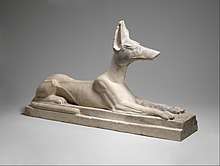Harry Smith (Egyptologist)
Henry Sidney "Harry" Smith, FBA (born 14 June 1928) is a British Egyptologist and academic, specialising in epigraphy and Egyptian archaeology. He held the Edwards Chair of Egyptology at University College London from 1970 to 1986. He had previously been a lecturer in Egyptology at the University of Cambridge, where he was also Budge Fellow in Egyptology at Christ's College, Cambridge.
Harry Smith | |
|---|---|
| Born | Henry Sidney Smith 14 June 1928 |
| Nationality | British |
| Citizenship | United Kingdom |
| Academic background | |
| Education | Merchant Taylors' School, Northwood |
| Alma mater | Christ's College, Cambridge |
| Academic work | |
| Discipline | Egyptology |
| Sub-discipline |
|
| Institutions |
|
Early life and education
Smith was born on 14 June 1928 to Sidney Smith, FBA, an Assyriologist and curator, and his wife Mary (nee Parker), an artist.[1][2] He was educated at Merchant Taylors' School, Northwood, an all-boys independent school.[1] He went on to study classics and Egyptology at Christ's College, Cambridge, graduating with a Bachelor of Arts (BA) degree in 1953:[3] as per tradition, his BA was later promoted to a Master of Arts (MA Cantab) degree.[1] He then studied Demotic, a late Ancient Egyptian script, under Stephen Glanville.[3] He was awarded a Doctor of Letters (DLit) degree by the University of London in 1987.[1]
Academic career

From 1953 to 1953, Smith worked as an epigraphist on the Theban tombs, and was an assistant to W. B. Emery at his archaeological excavation at Saqqara.[4][3] He was appointed a lecturer in Egyptology at the University of Cambridge in 1954, and was elected Budge Fellow in Egyptology at Christ's College, Cambridge the following year.[5] He continued to assist at excavations in Egypt and Nubia, working at the Buhen fortress and Qasr Ibrim from 1959.[4] In 1961, he directed the Egypt Exploration Society's archaeological survey of Egyptian Nubia.[4][3]
In 1963, he moved to University College, London (UCL), where he had been appointed Reader in Egyptian Archaeology.[1] He was additionally appointed an honorary curator of the Petrie Museum of Egyptian Archaeology, a position he held between 1963 and 1970.[5] From 1964 to 1965, he once more directed the EES's Egyptian Nubian Survey.[1] He was field director of the excavations at Saqqara's Sacred Animal Necropolis between 1964 and 1976.[4][3] In 1970, he was appointed to the Edwards Chair of Egyptology and head of UCL's Department of Egyptology.[1] He directed excavations at Saqqara and Memphis between 1970 and 1988.[1] He stepped down from the chair in 1986 and as head of department in 1988.[1] He was made Professor Emeritus of Egyptology by UCL in 1993, upon his retirement.[5][4]
Personal life
In 1961, Smith married Hazel Flory Leeper. His wife predeceased him, dying in 1991.
Honours
In 1985, Smith was elected a Fellow of the British Academy (FBA), the United Kingdom's national academy for the humanities and social sciences.[5]
Selected works
- Smith, Harry S. (1962). Preliminary Reports of the Egypt Exploration Society's Nubian Survey. Cairo: Government Print.
- Smith, Harry Sidney (1974). A visit to ancient Egypt: life at Memphis & Saqqara, c. 500-30 B.C. Aris & Phillips. ISBN 978-0856680243.
- Smith, Harry Sidney (1976). The Fortress of Buhen: the inscriptions. London: Egypt Exploration Society.
- Emery, W. B.; Millard, A.; Smith, H. S. (1976). The Fortress of Buhen: the archaeological report. London: Egypt Exploration Society.
- Smith, H. S.; Davies, Sue (2005). The Sacred Animal Necropolis at North Saqqara. The falcon complex and catacomb: the archaeological report. London: Egypt Exploration Society. ISBN 978-0856981654.
- Smith, H. S.; Davies, Sue; Frazer, K. J. (2006). The Sacred Animal Necropolis at North Saqqara. The main temple complex: the archaeological report. London: Egypt Exploration Society. ISBN 978-0856981708.
References
- "Smith, Prof. Henry Sidney". Who's Who 2019. Oxford University Press. 1 December 2018. doi:10.1093/ww/9780199540884.013.U35364. Retrieved 4 September 2019.
- "Assyriology at the British Museum: Dr. Sidney Smith, F.B.A". Nature. 162 (4121): 645. 1 October 1948. Bibcode:1948Natur.162R.645.. doi:10.1038/162645b0. ISSN 1476-4687.
- "The Lady Wallis Budge Fellowships in Egyptology". The Journal of Egyptian Archaeology. 63: 131–132. 1977. doi:10.2307/3856312. JSTOR 3856312.
- "Professor Harry Smith". Egypt Exploration Society. Retrieved 4 September 2019.
- "Professor Henry Smith FBA". The British Academy. Retrieved 4 September 2019.